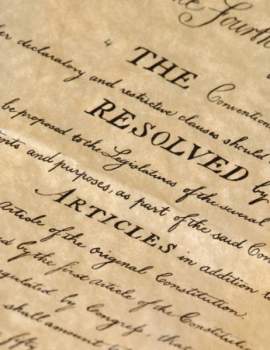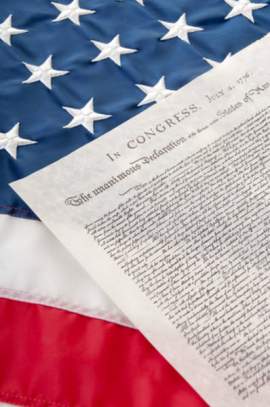
Edmund Randolph

Popular In Constitution
Purpose Of Lifetime Appointment And Pros And Cons Enumerated Powers Bicameral Legislature Background Article 3 Of The Constitution We The People 1st Amendment Who Wrote The Constitution Judicial Review Equal Protection Clause 5th Amendment 10th Amendment Three Fifths Compromise
Founding Fathers: Edmund Randolph
Randolph was born into a well-established Virginia family on August 10, 1753 in Williamsburg, Virginia. Edmund Randolph was tutored and later attended the College of William and Mary. After graduating, Edmund Randolph studied law under his father John Randolph and his Uncle Peyton. He then passed the Virginia bar, and started practicing law in Williamsburg, Virginia.
Once the American Revolution broke out, John Randolph kept his position as a Loyalist and returned to England with the royal governor, Lord Dunmore in 1775. Edmund Randolph stayed in America where he lived with his uncle Peyton Randolph, who was a prominent member in Virginia politics. During the Revolutionary War, Edmund Randolph showed his support by acting as an aide-de-camp to General George Washington.
After returning to Virginia after hearing about the death of his uncle, Edmund Randolph was elected to the Virginia Convention of 1776. This was the convention that established the Commonwealth of Virginia’s first constitution. During this time, Edmund Randolph was only 23 years old, making him the youngest member at the convention. Randolph married Elizabeth Nicholas in 1776.
Edmund Randolph was also elected as the Commonwealth of Virginia ’s first Attorney General as well as the Mayor of the city of Williamsburg in 1776. Afterwards, Edmund Randolph was elected to be a delegate for Virginia for the Continental Congress both in 1779 and 1881. During this time, he maintained his law practice, handling many issues for important politicians including George Washington. In 1786, Edmund Randolph was elected Governor of Virginia.
he following year, Edmund Randolph was a delegate from Virginia for the Constitutional Convention. Here, he introduced the Virginia Plan as a foundation for a new government for the country. Edmund Randolph argued against the importation of slaves and was in favor of the new government having a strong central government. He also supported a plan that had three chief executives from different areas of the country. The Virginia Plan also suggested two houses, where in both of these houses delegates were picked based on state population. Edmund Randolph additionally suggested, and was supported with unanimous approval by the Constitutional Convention's delegates, that having a national judiciary branch should be necessary. Article III of the United States Constitution created the federal court system, which did not exist under the Articles of Confederation.
Edmund Randolph was also a part of the Committee of Detail. This committee had the responsibility of converting the 15 resolutions of the Virginia Plan into the very first draft of the federal Constitution. While Edmund Randolph supported independence, he refused to sign the final version of the Constitution, because he felt that it did not have enough checks and balances placed. He published an account of his objections to the Constitution in October 1787. Despite this stance, he nevertheless changed his position in 1788 at the Virginia Ratifying Convention and voted for ratification of the Constitution since eight other states already ratified the Constitution, and he did not want Virginia to be left out of the new government.
President Washington's Cabinet
Edmund Randolph became the first United States Attorney General in September 1789 under President Washington, where he maintained a sense of neutrality between Thomas Jefferson and Alexander Hamilton. When Thomas Jefferson resigned as Secretary of State in 1793, Edmund Randolph succeeded him. The major diplomatic action of this term was in 1794 during the Jay Treaty with Britain, but it was actually Alexander Hamilton who created the plan and drafted the instructions, leaving Edmund Randolph the formal role of signing the papers. Edmund Randolph was hostile to the resulting treaty. At the end of his term as the Secretary of State, negotiations for the treaty were finalized.
As Secretary of State, Edmund Randolph faced many of the challenges that his predecessor, Thomas Jefferson, had tried to address during his term. Edmund Randolph managed the Citizen Genêt Affair’s settlement. Edmund Randolph also prompted the resumption of talks with Spain and also helped in the negotiations of the Treaty of San Lorenzo of 1795, which resulted in the opening of the Mississippi River to United States navigation and also adjusted the boundaries between the United States and Spanish possessions.
Resignation from the Cabinet
A scandal which involved an intercepted French message resulted in to Edmund Randolph’s resignation in August 1795. A correspondence was intercepted by the British Navy from the French minister, Joseph Fauchet, to the United States which was turned over to President Washington. Washington was disappointed that the letters showed contempt for the United States and that Edmund Randolph was mainly responsible for it.
The letters suggested that Randolph had revealed the inner arguments in the cabinet to the French government and suggested that the United States Administration was hostile to France. President Washington immediately overruled Edmund Randolph’s negative advice about the Jay Treaty. A few days later President Washington, in the presence of the full cabinet, handed the minister's letter to Edmund Randolph and demanded that he explain it.
Randolph was absolutely speechless and resigned immediately. It was concluded that Edmund Randolph was not bribed by the French but rather, he was rather a pitiable figure who sometimes lacked good sense. However, Edmund Randolph's own published Vindication showed his concerns regarding both private and public perceptions of his character, which were concerns that had great value during the 18th century. After leaving the President’s cabinet, Edmund Randolph returned to Virginia to continue his practice. During this time, his most famous case was one where he defended Aaron Burr for treason in 1807.
During his retirement from politics, Edmund Randolph wrote a history of Virginia. On September 12, 1813 Randolph passed away at the age of 60. He was buried in a graveyard at a nearby chapel.
Fun Facts about Edmund Randolph
• Edmund Randolph practiced the law until his death.
• The only proof of any tension between him and his father about the Revolution was in one letter where he was worried about his father’s actions would affect his reputation.
• Because of the generosity of his relatives, he avoided poverty in his old age.



















